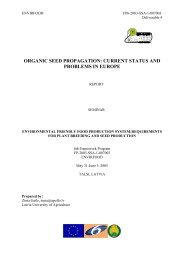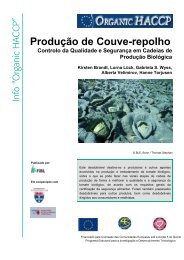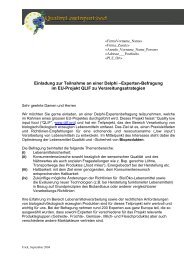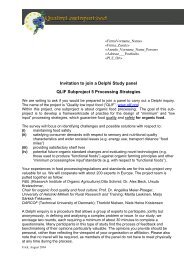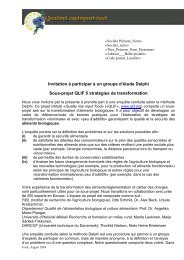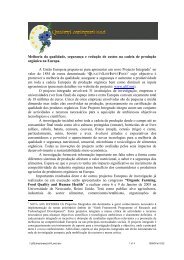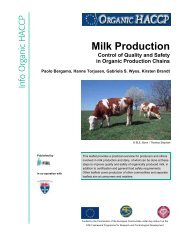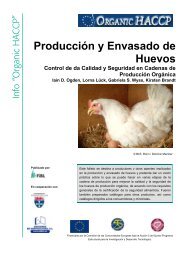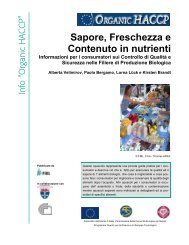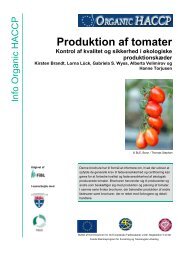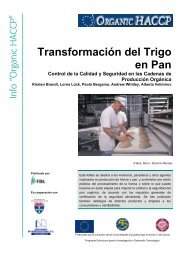Sustaining Animal Health and Food Safety in ... - CORE Organic
Sustaining Animal Health and Food Safety in ... - CORE Organic
Sustaining Animal Health and Food Safety in ... - CORE Organic
Create successful ePaper yourself
Turn your PDF publications into a flip-book with our unique Google optimized e-Paper software.
SAFO<br />
<strong>Susta<strong>in</strong><strong>in</strong>g</strong> <strong>Animal</strong> <strong>Health</strong> <strong>and</strong> <strong>Food</strong><br />
<strong>Safety</strong> <strong>in</strong> <strong>Organic</strong> Farm<strong>in</strong>g<br />
The organic farm<strong>in</strong>g sector has experienced a rapid growth over the past<br />
decades. The growth has raised the need to address food safety aspects <strong>in</strong><br />
relation to animal health, the farm situation <strong>and</strong> the liv<strong>in</strong>g conditions of animals.<br />
Furthermore, the EU-regulations need to be put <strong>in</strong>to perspectives when food<br />
safety is considered.<br />
The objective of SAFO is to improve food safety <strong>and</strong> animal health <strong>in</strong> organic<br />
livestock production systems through exchange <strong>and</strong> active communication of<br />
research results <strong>and</strong> conclusions between researchers, policy makers, farmer<br />
organisations <strong>and</strong> other stakeholders, <strong>in</strong>clud<strong>in</strong>g consumers.
The growth <strong>in</strong> organic livestock production<br />
In the past decade, the European organic livestock<br />
production has experienced rapid growth.<br />
Conversion to organic production implies that<br />
the whole way of management has to be<br />
developed <strong>and</strong> adjusted to organic pr<strong>in</strong>ciples.<br />
This <strong>in</strong>cludes emphasis<strong>in</strong>g the importance of a<br />
systems approach to animal health <strong>and</strong> welfare<br />
protection, <strong>and</strong> m<strong>in</strong>imiz<strong>in</strong>g the use of veter<strong>in</strong>ary<br />
drugs.These developments are not always<br />
without problems.<br />
Recommended practices <strong>in</strong> the European<br />
<strong>Organic</strong> Livestock St<strong>and</strong>ards (EU Regulation<br />
1804/1999) such as closed herds <strong>and</strong> flocks <strong>and</strong><br />
improved health security on farms, also <strong>in</strong>clude<br />
extensive production systems (e.g. free range<br />
production) that expose livestock to <strong>in</strong>creased<br />
disease challenge.<br />
An EU-funded Concerted Action project, Network<br />
for <strong>Animal</strong> <strong>Health</strong> <strong>and</strong> Welfare <strong>in</strong> <strong>Organic</strong><br />
Agriculture (NAHWOA) identified <strong>in</strong> 2001 that<br />
organic livestock production faces major<br />
challenges with regard to harmonisation <strong>and</strong><br />
successful <strong>in</strong>tegration of organic animal husb<strong>and</strong>ry<br />
<strong>in</strong>to the whole organic production system.<br />
Major questions about food quality <strong>and</strong> safety<br />
exist, <strong>in</strong> conventional, as well as organic livestock<br />
production.The NAHWOA-network successfully<br />
produced a number of recommendations <strong>and</strong><br />
guidel<strong>in</strong>es on animal health <strong>and</strong> welfare.<br />
More focus on human health <strong>and</strong> food safety<br />
Consumers’ <strong>in</strong>terests, human health aspects, <strong>and</strong><br />
food safety issues were not covered <strong>in</strong> the<br />
NAHWOA project.There is a urgent need to<br />
focus on these aspects <strong>and</strong> relate them to animal<br />
health <strong>and</strong> the farm situation, the liv<strong>in</strong>g<br />
conditions of animals, <strong>and</strong> the choices which are<br />
necessary to make. Furthermore, the EUregulations<br />
need to be put <strong>in</strong>to perspectives<br />
seen from a food safety angle, <strong>and</strong> the wide<br />
diversity between European countries need to be<br />
<strong>in</strong>cluded <strong>in</strong> the discussion.<br />
In pr<strong>in</strong>ciple, organic st<strong>and</strong>ards on livestock<br />
production must secure animal health <strong>and</strong> food<br />
safety, they must comply with common EU<br />
st<strong>and</strong>ards, they should allow farm<strong>in</strong>g systems <strong>in</strong><br />
harmony with their geographic <strong>and</strong> cultural<br />
localities.They should also be the result of a<br />
productive discussion between researchers,<br />
policy makers, farmers <strong>and</strong> consumers.
The objectives<br />
The ultimate objective of the SAFO project is to<br />
improve food safety <strong>and</strong> animal health <strong>in</strong> organic<br />
livestock production systems <strong>in</strong> exist<strong>in</strong>g <strong>and</strong><br />
c<strong>and</strong>idate member countries of the European<br />
Union through exchange <strong>and</strong> active communication<br />
of research results <strong>and</strong> conclusions between<br />
researchers, policy makers, farmers <strong>and</strong> the<br />
wider stakeholder community, <strong>in</strong>clud<strong>in</strong>g<br />
consumers.<br />
We achieve this by:<br />
Provid<strong>in</strong>g a network <strong>in</strong> which consumer <strong>and</strong><br />
policy maker concerns about food safety,<br />
animal health <strong>and</strong> welfare <strong>in</strong> the exp<strong>and</strong><strong>in</strong>g<br />
field of organic livestock production <strong>in</strong><br />
exist<strong>in</strong>g <strong>and</strong> c<strong>and</strong>idate EU member countries<br />
can be addressed.<br />
Support<strong>in</strong>g the process of development <strong>and</strong><br />
implementation of EU-st<strong>and</strong>ards <strong>in</strong> organic livestock<br />
production <strong>in</strong> the diverse climate of<br />
agricultural production systems <strong>in</strong> the member<br />
countries.<br />
The ma<strong>in</strong> <strong>in</strong>termediate objectives of the project<br />
are to:<br />
Identify important food quality characteristics<br />
l<strong>in</strong>ked to organic livestock products, <strong>and</strong><br />
improve food quality, <strong>in</strong>clud<strong>in</strong>g food safety<br />
with regard to zoonoses, drug residues <strong>and</strong><br />
the development of anti-microbial resistance<br />
<strong>in</strong> the food cha<strong>in</strong>.This objective also <strong>in</strong>cludes<br />
aspects of food process<strong>in</strong>g quality with regard<br />
to animal health <strong>and</strong> welfare <strong>in</strong> organic livestock<br />
production systems.<br />
Develop strategies for implement<strong>in</strong>g <strong>and</strong><br />
harmonis<strong>in</strong>g organic livestock production<br />
st<strong>and</strong>ards <strong>in</strong> exist<strong>in</strong>g <strong>and</strong> c<strong>and</strong>idate member<br />
countries.<br />
Improve the <strong>in</strong>teraction between researchers,<br />
farmers, certification bodies <strong>and</strong> policy<br />
makers <strong>in</strong> order to guarantee the development<br />
of organic livestock st<strong>and</strong>ards that are<br />
driven by <strong>in</strong>puts from all stakeholders <strong>in</strong> the<br />
EU.<br />
The cornerstone of SAFO is a series of five<br />
thematic workshops:<br />
1 st SAFO workshop<br />
In early September 2003, the first workshop <strong>in</strong><br />
the SAFO-network was held <strong>in</strong> Florence, Italy.The<br />
workshop focused on "socio-economic aspects of<br />
organic animal production - both on farm level<br />
<strong>and</strong> <strong>in</strong> a social context".<br />
2nd SAFO workshop<br />
The second SAFO workshop "Development of<br />
organic livestock farm<strong>in</strong>g: potential <strong>and</strong> limitations<br />
of husb<strong>and</strong>ry practice to secure animal<br />
health, welfare <strong>and</strong> food quality" was held on the<br />
25-27 th March 2004, <strong>in</strong> Witzenhausen, Germany.<br />
3 rd SAFO Workshop<br />
The third SAFO workshop was held <strong>in</strong> Falenty,<br />
Pol<strong>and</strong> on the 16-18 th September 2004.The<br />
workshop theme was "Enhanc<strong>in</strong>g animal health<br />
security <strong>and</strong> food safety <strong>in</strong> organic livestock<br />
production systems".<br />
Proceed<strong>in</strong>gs together with abstracts translated<br />
<strong>in</strong>to partner languages can be found via the<br />
workshop homepage.<br />
4 th SAFO Workshop<br />
The theme for the fourth SAFO Workshop held <strong>in</strong><br />
Frick, Switzerl<strong>and</strong> on the 17 th -19 th March 2005<br />
was "Systems development: Quality <strong>and</strong> safety of<br />
organic livestock products".<br />
The <strong>in</strong>formation presented formally <strong>and</strong> the ideas<br />
discussed at the workshops are published <strong>in</strong><br />
proceed<strong>in</strong>gs. Proceed<strong>in</strong>gs together with abstracts<br />
translated <strong>in</strong>to partner languages can be found<br />
via this workshop homepage.<br />
5 th SAFO Workshop<br />
The fifth SAFO workshop, where the conclusions<br />
<strong>and</strong> the recommendations from the project will<br />
be presented <strong>and</strong> discussed, will be held as a<br />
part of the Jo<strong>in</strong>t European <strong>Organic</strong> Congress.This<br />
congress takes place <strong>in</strong> Odense, Denmark on the<br />
30 & 31 May 2006.A separate workshop <strong>in</strong> the<br />
SAFO project will be held either 29 th May or 1 st<br />
June (<strong>in</strong>formation will appear on our website<br />
when the exact date is decided).
Facts on the SAFO-project<br />
The full title of the project is:“<strong>Susta<strong>in</strong><strong>in</strong>g</strong> <strong>Animal</strong><br />
<strong>Health</strong> <strong>and</strong> <strong>Food</strong> <strong>Safety</strong> <strong>in</strong> <strong>Organic</strong> Farm<strong>in</strong>g”.<br />
SAFO is a European Commission funded<br />
Concerted Action Project, Contract QLK5 – CT –<br />
2002 – 02541.<br />
Project duration<br />
The project started <strong>in</strong> March 2003 <strong>and</strong> will last<br />
for 3 years. It <strong>in</strong>volves partners from 26<br />
European countries.<br />
Project participants<br />
Danish Institute of Agricultural Sciences,<br />
Denmark<br />
The University of Read<strong>in</strong>g, United K<strong>in</strong>gdom<br />
University of Kassel, Germany<br />
Scottish Agricultural College, United K<strong>in</strong>gdom<br />
University of Wales, United K<strong>in</strong>gdom<br />
Forschungs<strong>in</strong>stitut für Biologischen L<strong>and</strong>bau,<br />
Switzerl<strong>and</strong><br />
Universitá degli studi di Firenze, Italy<br />
Swedish University of Agricultural Sciences,<br />
Sweden<br />
Norwegian Centre for Ecological Agriculture,<br />
Norway<br />
Institute for L<strong>and</strong> Reclamation <strong>and</strong> Grassl<strong>and</strong><br />
Farm<strong>in</strong>g, Pol<strong>and</strong><br />
Bundesforschunganstalt für L<strong>and</strong>wirtschaft,<br />
Germany<br />
University of Veter<strong>in</strong>ary Medic<strong>in</strong>e, Slovak<br />
Republic<br />
Universitaet fuer Bodenkultur Wien,Austria<br />
Institute for Susta<strong>in</strong>able Development, Slovenia<br />
University of Hels<strong>in</strong>ki, F<strong>in</strong>l<strong>and</strong><br />
The Royal Veter<strong>in</strong>ary <strong>and</strong> Agricultural University,<br />
Denmark<br />
Louis Bolk Institut, Holl<strong>and</strong><br />
Instituto de Sociología y Estudios Campes<strong>in</strong>os de<br />
la Universidad de Córdoba, Spa<strong>in</strong><br />
Estonian Agricultural University, Estonia<br />
Institute for L<strong>and</strong> Reclamation <strong>and</strong> Grassl<strong>and</strong><br />
Farm<strong>in</strong>g, Pol<strong>and</strong><br />
Latvian University of Agriculture, Latvia<br />
Università degli Studi di Milano, Italy<br />
University catholique de Louva<strong>in</strong>, Belgium<br />
University of Thessaloniki, Greece<br />
Szent István University, Hungary<br />
Ecole Nationale dÍngeneieurs des Techniques<br />
Agricoles de Clermont-Ferr<strong>and</strong>, France<br />
Project coord<strong>in</strong>ator<br />
Mette Vaarst, Danish Institute of Agricultural<br />
Sciences, Denmark<br />
How to get <strong>in</strong>formation about the project<br />
The primary website for the SAFO project is at: http://www.safonetwork.org.<br />
Activities <strong>in</strong>clude workshops, reports, technology transfer, facilitation of research proposals,<br />
recommendations on organic livestock st<strong>and</strong>ards etc. Emphasis is on the exchange of<br />
<strong>in</strong>formation, dialogue <strong>and</strong> communication.<br />
In May 2006, the project will participate <strong>in</strong> the major organic congress to be held <strong>in</strong> Odense,<br />
Denmark.The congress will be held <strong>in</strong> collaboration with a number of other EU funded<br />
projects.<br />
Photos <strong>and</strong> edit<strong>in</strong>g: DARCOF · Graphic Design: S<strong>in</strong>e Claudell, Enggaardens Tegnestue. 09.2005




